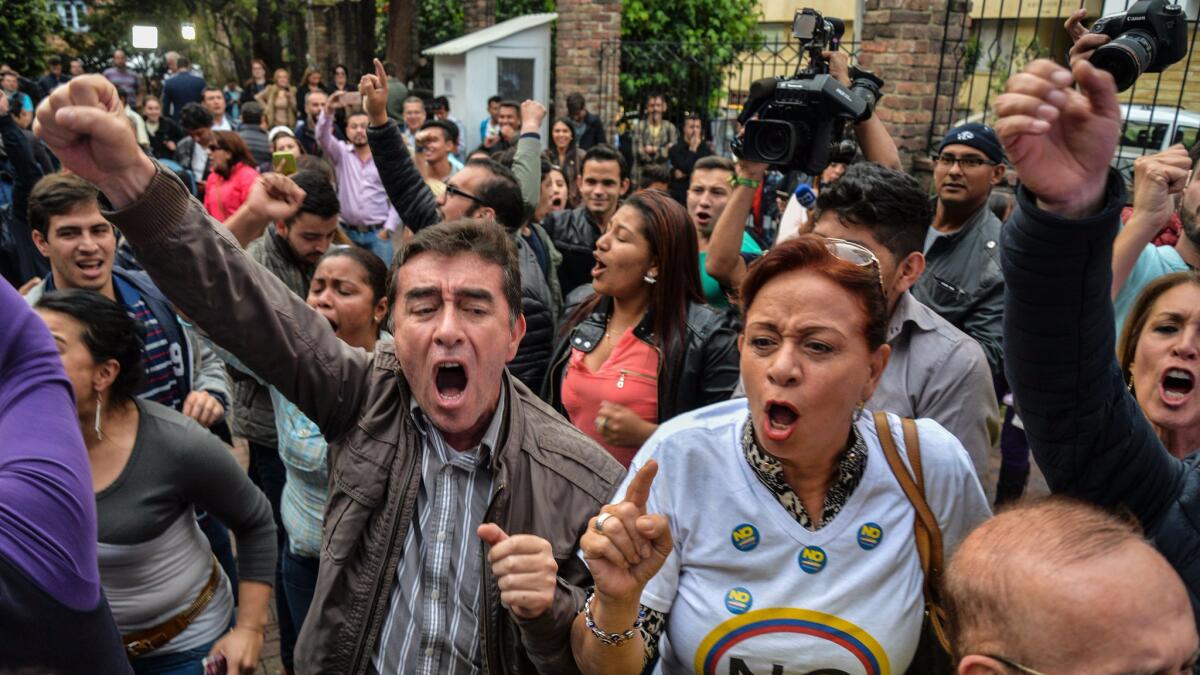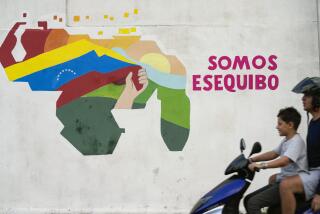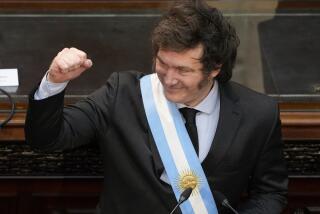Colombian voters reject peace deal between the government and FARC rebels

Colombian voters narrowly rejected a historic peace agreement between the government and the country’s largest rebel group Sunday, raising the potential that the longest armed conflict in the Western Hemisphere might resume.
It was a shocking turn of events. Every national poll had predicted that voters would endorse the agreement, which was to have ended a 52-year-old civil war between the military and the Revolutionary Armed Forces of Colombia, better known as the FARC.
In a brief nationally televised address, President Juan Manuel Santos recognized his defeat at the polls “by the tightest of margins” — it was decided by less than half a percentage point — but said he was not ready to give up his quest for a peace agreement.
“I’ll continue to search for peace until the last moment of my mandate,” he said.
Santos said a cease-fire would remain in place and that he would convene a meeting Monday of all Colombia’s political forces to consider their options. “I will listen to everyone, including those who voted no,” he said. “We will look for a path to take so that the peace we all want is possible.”
FARC leader Rodrigo Londoño, best known by his war alias Timochenko, said in a statement from Havana that he lamented the decision of the voters to follow the “destructive power” of opponents of the deal but that the FARC would continue to look for ways to achieve peace. “Peace will triumph,” he said.
The deal, which called for an estimated 6,000 guerrilla fighters to give up arms and form a political party, was signed by both sides last week in Cartagena in a celebratory ceremony before an audience of world leaders dressed symbolically in all white. U.S. Secretary of State John F. Kerry was in attendance.
“This is really a leap into the unknown,” said Adam Isacson, a senior researcher at the Washington Office on Latin America think tank. “This comes six days after a signing ceremony witnessed by world leaders from the White House to the Vatican who said this was the way to go.”
President Obama, Venezuelan President Nicolas Maduro and Pope Francis all threw their support behind the accord.
The nationwide vote is not binding, as Colombia’s Constitutional Court upheld Santos’ right to negotiate and sign a deal on his own. But Santos has said on numerous occasions that a majority of Colombians must approve the deal for its implementation, which requires the Congress to approve billions of dollars in spending to redistribute land and provide cash payments to demobilized rebels to help them start businesses.
He had also said that he would not renegotiate the deal and that the only Plan B was a return to war.
Against the importance of the occasion, the turnout was surprisingly low at 37%, with about 13 million of the country’s 35 million eligible voters casting ballots. Participation was suppressed in part by Hurricane Matthew, whose heavy rains in the country’s Caribbean coastal states flooded many polling places.
Results from several of those states showed voters who managed to cast their ballots favored the peace deal by substantial margins.
But the nationwide tally told a different story. With 99.9% of ballots counted, the “no” campaign carried a tiny but insurmountable lead, taking 50.2% of the vote. The margin of victory was about 54,000 votes.
The finally tally was a stinging defeat to Santos and a victory for opposition leader Alvaro Uribe, who conducted a major military offensive against the FARC when he was president from 2002 to 2010.
He waged a vigorous campaign to defeat the deal, arguing that it was too lenient toward the guerrillas. Under the agreement, those who confessed to murder, kidnapping, extortion and other crimes and expressed forgiveness would receive relatively light sentences.
Many military veterans, victims rights groups and wealthy farmers agreed, as did several voters interviewed Sunday in the capital, Bogota.
“There is still extortion in the rural area where I come from in Santander province, and if it passes it will only bring more problems,” said voter Luis Albeiro Alfonso, an accountant. “Other rebel groups or criminal gangs will fill the space left by the FARC.”
Octavio Escobar, a psychologist, said the peace deal offered what amounted to “impunity” to rebels he believed would continue drug trafficking and money laundering even if peace is proclaimed.
Other voters objected to monthly stipends that demilitarized rebels are to receive once they give up their arms as well as the deal’s guarantee that at least 10 seats in Congress would go to the FARC.
Many no voters said they didn’t understand the implications of the agreement. “I voted against it,” said security guard Jony Prieto. “It was confusing, poorly done and we didn’t really know what was included in the deal.”
Before the vote, Uribe had said that he hoped a popular rejection of the agreement would lead to a renegotiation of the deal, a daunting prospect considering how long it took to reach this point.
While both sides say they want peace, they must first adjust to the new political reality.
The rebels held what now seems like a premature celebration last month, inviting hundreds of journalists to rebel-held territory for an event in which guerrillas wore civilian clothes, sang about peace at nightly concerts and talked about their coming transition to civilian life.
It was a new face for the FARC, formed half a century ago when groups of peasants calling for land redistribution retreated to the jungle to take up arms against the government. Decades of fighting against soldiers and conservative paramilitary groups left a quarter million Colombians dead and millions displaced.
Voters’ rejection of the deal calls into question the immediate future of the guerrillas, who under the terms of the deal were preparing to disarm completely within six months.
It also calls into question the future of Santos and his Social Party of National Unity.
In the same way British Prime Minister David Cameron tied his future to the “Brexit” referendum on leaving the European Union, Santos staked his presidency on the peace deal.
Both Brexit and the Colombia vote defied poll predictions and were decided by razor-thin margins. Cameron stepped down after British voters decided to leave the EU.
Kraul is a special correspondent.
ALSO
He said, ‘I’m on my way, Mama.’ Then, like thousands of others in Mexico, he vanished
How much do allies pay for U.S. troops? A lot more than Donald Trump says
UPDATES:
8:07 p.m.: This article was updated to say that a ceasefire would remain in place.
7:45 p.m.: This article was updated with additional reporting and analysis throughout.
6:25 p.m.: This article was updated with additional quotes from President Juan Manuel Santos’ televised speech.
5:57 p.m.: This article was updated throughout with details about the election results, comments from the Colombian president and the FARC leader as well as background on the deal.
This article was originally published at 4:05 p.m.
More to Read
Start your day right
Sign up for Essential California for news, features and recommendations from the L.A. Times and beyond in your inbox six days a week.
You may occasionally receive promotional content from the Los Angeles Times.







